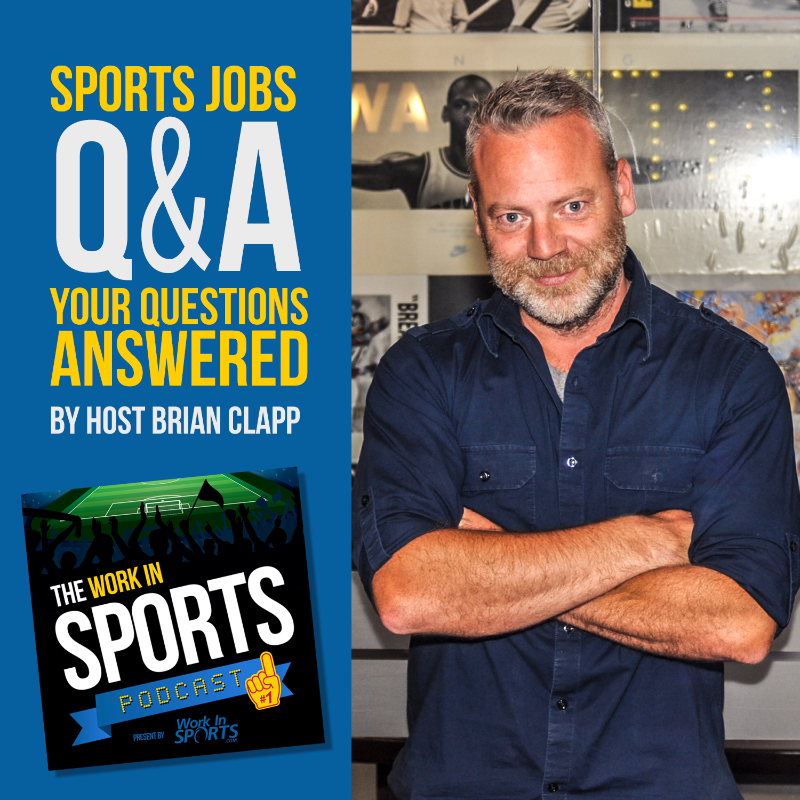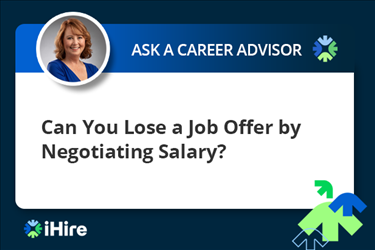- Job Seeker Resources
- |
- Last Updated: May 17, 2021

The Keys to Effective Salary Negotiation - Work In Sports Podcast
Hey everybody, I’m Brian Clapp VP of Content and Engaged Learning for WorkInSports.com and this is the Work in Sports podcast!
Alright, a quick recap of the past few weeks shows -- they’ve been awesome. If you haven’t listened go back and check out:
- Raleigh Anne Gray, CEO of Must Love Sports and Senior Director of Athlete Exchange for Wasserman
- Melissa Silberman, Atlanta hawks Director of Partnership Activation
- Ameena Soliman, Player Personnel Coordinator for the Philadelphia Eagles
- Neeta Sreekanth COO of INFLCR
I just noticed that it’s been ladies’ night on the Work In Sports podcast for the last month-- love that! It wasn’t even intentional!
Coming up this week is Kevin Brown, Director of Community Relations for the Detroit Red Wings and Director of the Detroit Red Wings Foundation -- super cool guy, I learned a lot about the power of community relations from our conversation. I know you will like it.
We’re also getting all of our fall semester sports curriculums up and running -- for those of you who don’t know, we have an online Sports Career Game Plan program with over 120 pages of content, 30+ videos, downloadable worksheets and audio files and more.

Our program is being used by Grand Canyon University, University of Florida, Ball State, University of Findlay, Fontbonne University, Dubuque University, and many more.
If you are a professor listening, this program is available to you -- it teaches the strategies and tactics to get hired in sports. Period. From the feedback we’ve received from students, it’s life-changing.
If you are interested in learning more or seeing a demo -- email me - b clapp at work in sports dot come.
If you are a student -- push your professor to learn more about our program. Your goal is to get a job after college, and we’ll teach you how.
Alright on to today.
Before we get into today’s question - I have a request for all of you. I need more podcasts to listen to, personally.
Now, here are the rules:
- I don’t need more sports podcasts, I have plenty of those and I know what I like.
- I need more podcasts for when I’m not listening to sports.
- I don’t need political podcasts, I have a few I listen to and respect, and I’m well covered there.
- I really really like well-produced professional podcasts that tell a story over a 6-10 episode arc.
- Examples: Winds of Change, The Clearing, The Catch and Kill podcast..and the granddaddy Serial.
- If you have any interview-style shows, like mine but not necessarily related to sports or sports careers, let me know those too...I’m always trying to improve my questioning and techniques.
I’m looking for more smart, insightful podcasts so if you have a suggestion that hooked you - please let me know. I’m a content junkie, and I like to learn.
Jump over to our private Facebook group, by searching for the Work In Sports podcast on Facebook - answer a few questions so I know you are for real, and let me know what you like and are listening to right now.
I’ll start the thread over there and you can all share…
OK, now to today’s question from John in Los Angeles… and I’ll be honest, it’s a subject I don’t like very much:
“Hi Brian, I’ve recently graduated and while the world is turned upside down a bit right now I am lucky to be in the midst of interviewing with two companies. Your advice over the years has really really helped me, I wouldn’t be where I am right now, feeling like success has arrived, without your help.
My question is simple -- I think both companies are going to offer me positions -- how do I negotiate to get the best deal for myself and my future? “
Hey John, thanks for the kind words and I’m thrilled to know I helped. Even if it’s just 1%, I’m glad to be a part of your story.
Negotiation is so incredibly important, but it’s also awkward and difficult… for everyone.
The first thing to recognize is that you are venturing into an area many many people are afraid to even travel down. So take it easy on yourself as you traverse this awkward, but essential, path. You will get better at it over time, and more confident in your worth and value to an organization.
It’s tough as a person new to the workforce, but it is still a skill you should develop and embrace because it can make a huge difference in your lifetime of earning. Everything salary-related from this point forward will build off your starting point.
No pressure! Let’s make this simple, at the beginning it’s important to lean into best practices.
1: The negotiation starts way, way, way before you talk about money.
I was in a session last week with students from Syracuse - it was about 70 young professionals and we had a great hour-plus session. One of the students asked “what is the biggest mistake you see people make in the interview process?”
I covered a lot of subjects with my response, since I always seem to have 10 things when people just ask for one. BUT, one of my primary pieces of advice was that people try to often try so hard to remain “professional” that they fail to show excitement or passion. It is OK to show enthusiasm and excitement about the role, matter of fact it’s encouraged!
Now why do I bring this up -- because in the interview process if you are likeable, passionate, enthusiastic, and show off your skills -- you are the type of person that someone will fight for when hiring..
If you are interviewing with me for example, and we connect on all levels and I really like you, I am sold on your being the match -- I can see myself working with you and know you have the skills --I become your advocate in the building.
Now, when you say a simple script about your salary, which we will get into the details of later, I really like you, I’ve already started to imagine you as a part of our organization and part of my team…so I’m going to go to my boss saying, here’s what we offered, here’s where they countered, I think we should do it.
Having an advocate in the building is essential to a salary negotiation, and you only achieve that by being likable, enthusiastic and passionate in the interview process.
2: Be exacting and well researched.
You can’t just say, I’d like 10% higher than what you have offered and an extra week of vacation. You need a reason, a story, and market research.
You have to be able to articulate why an increase in salary or benefits makes sense and is justified.
One of the most effective manners I have seen for negotiation is for the interviewee to know with high detail the cost of living for a certain area. How much it costs for rent, electricity, water, entertainment, gas, etc. and be ready to present that as a minimum salary you are willing to accept.
Now, I don’t mean present a spreadsheet to them with your living expenses, -- but if you say to your interviewer, I’ve done detailed research into the cost of living in this area, and have determined that to be a successful member of your team, I;’d need to make a minimum of XX per year in salary.
This makes you seem less like you are trying to maximize every cent, and more like you are trying to achieve stability and be a part of the team.
3: Don’t tell me everyone else who wants to hire you.
Some people try to force the idea of leverage. They think if I spill out everyone I’ve ever interviewed with that’ll make company X pony up more to get me. Don’t overplay your hand.
For me, and just about everyone I know in the sports biz when we hear someone saying “Well, I have offers from companies X, Y, and Z -- how can you make it worth my while to choose your company?” I don’t fall into this trap.
This person fits into one of two categories for me:
- They really want to work at one of the other companies but are trying to get me to increase my offer so they can leverage it against the other company. And sorry, I’m not going to be your negotiating tool.
- Or, they don’t really want this job. And sorry, I don’t want to hire someone who doesn’t really want to be here.
My advice - say that you want to make it work with this company, that you are excited about the direction and can see yourself growing and thriving with this team, and then articulate why you want/need/deserve a higher salary.
If you want to leverage one offer -- be specific about it: “I have an offer on the table from another company and they have offered me X base salary -- I want to work for your organization, if you can match that, I’m in.”
That is a much more effective technique than trying to look like the big boss in command and in demand. Humility plays. And making it clear you want to work with this company and aren’t just using them for leverage, is important.
Just to bring it all together -- I guarantee you when Leigh Steinberg sat across from the Kansas City Chiefs negotiating for the largest contract in NFL history - he didn’t say “well if you don’t pony up now Pat is gone as soon as his contract is up!”
I’m sure he said, and I know this because I’ve talked with him about his negotiating technique “Pat wants to play here for the rest of his career, he wants to win more super bowls in Kansas City, let’s make a deal that wraps him up for life and makes sense for all parties”
Now that’s a negotiation technique that works. It doesn’t mean you accept less, clearly, he didn’t, but it sends the message i want to b here, and that tends to open people up to solutions rather than defensiveness.
4: Be flexible in your needs and wants.
You have to understand the company you are negotiating with and the larger macroeconomic pressures.
What is happening in their world and their sector of the industry -- are they thriving? Are they struggling? Is the industry or sector as a whole slowing down or trending up?
Knowing this can help you pivot. If you ask for more money, and they balk, it may just mean they can’t do THAT thing right then. So pivot. If you want to be there and it is a good job for you, come off the salary bump and ask for more vacation, a gym membership, higher 401k contribution -- other things can equate to great long-term value and they may be more amenable to those things.
One other suggestion -- if it’s a big organization, know what other companies they own. If you worked at Turner Sports in the 1990’s they owned the Atlanta Braves -- you could negotiate for Braves tickets.
A job offer includes more than just salary - remember components other than salary!
5: Don’t fight over everything.
Negotiate for things that are important to you, but don’t just negotiate because you took a class on negotiating. If you are fighting over every last detail of your job offer the message that sends is that you will be a problem employee. They may start to regret their interest in you and pull back from the offer.
Be choosy, focus on what really makes a difference for you.
6: Where is your leverage?
When you are a seasoned employee with lots of experience and a skill set that perfectly matches a job -- your leverage is obvious. It’s your match and value -- the employer sees you as the solution for their needs.
When you are earlier in your career your leverage is a little different. Your leverage is smaller, but it does exist and it goes back to my first point.
If you are likable, skilled, and passionate in the interview process and they really like you -- the idea of losing you is your leverage. They don’t want to go back out and find someone else they like...they are so close to the finish line! Going back to the beginning stinks! They want to hire you and move on to training and onboarding -- they want to get closer to solving the problem you are set to fill.
Now this leverage isn’t as strong as other points of leverage, but it can be effective as long as you aren’t too greedy. Stay within 5-10% of their offer, and you’ll make it hard to say no.
Thanks for listening - subscribe to the Work In Sports podcast wherever you listen to podcasts!

Originally Published: August 10, 2020
Sign In or Register to access all articles and insider tips for help in your job search.
Search for Sports Jobs
RELATED JOBS
Screen reader users may encounter difficulty with this site. For assistance with applying,...
Assistant Director, Camps & Event Mgmt.Screen reader users may encounter difficulty with this site. For assistance with applying,...
Assistant Swim Team CoachPosition Summary As an Aquatics Assistant Swim Team Coach, you must enjoy working in a...
Registered Dietitian - Full TimeOverview Position: Registered Dietitian Location: Select Specialty Hospital Columbus South -...
Building Security Guard (2Nd Shift)Building Security Guard (2nd Shift) Columbus Blue Jackets Arena Management - Entry Level...
RELATED RESOURCES
Find the Right Job Faster
- Get personalized job matches sent to your inbox every day
- Connect directly with employers before your competition
- Advance your career with expert advice on interviewing, salary negotiation, and more
We value your privacy

![Get Paid What You’re Worth: Salary Research Essentials [Video Webinar]](https://p-gpb8fhd4b9fbh6fy.z01.azurefd.net/cms/4229ee82-adc1-4930-a979-9163c2e1a228/a543cdb0-d4ba-44b5-bce9-f919d40df444-md.png)


